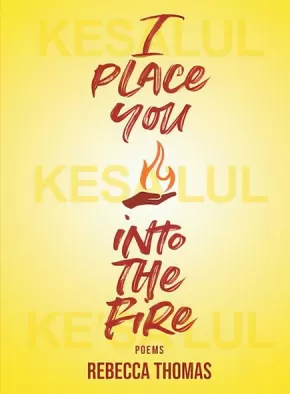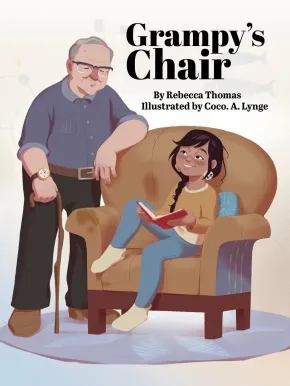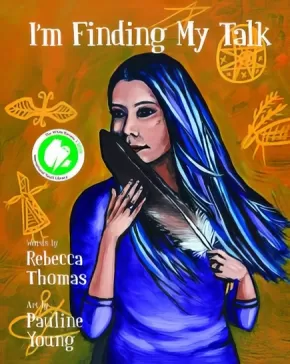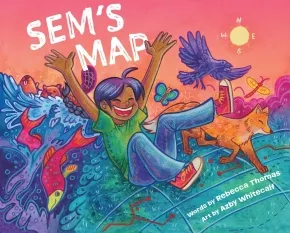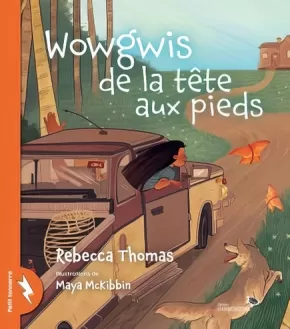
Rebecca Thomas
Rebecca Thomas is a Mi’kmaw woman registered with Lennox Island First Nation. She is the daughter of a residential school survivor and unrelenting advocate for her community. She is a published poet and was the Halifax Poet Laureate from 2016 to 2018. She lives in K’jipuktuk, Mi’kma’ki.
Books (1)
I Place You into the Fire
$18.95
Format: Paperback
Text Content Territories:
Indigenous Canadian; First Nations; Mi'kmaq;
Grade Levels: 12; University/College;
ISBN / Barcode: 9781771088855
Synopsis:
Synopsis:
The incisive and vital first poetry collection from Mi'kmaw spoken-word poet and former poet laureate of Kjipuktuk (Halifax), Nova Scotia.
We remember tomorrow and a thousand years ago.
From eel weirs to the buffalo.
We remember petroglyphs and Instagram photos.
See, we remember our history,
Without statues, money, or pictures of the Queen.
In Mi'kmaw, three similarly shaped words have drastically different meanings: kesalul means "I love you"; kesa'lul means "I hurt you"; and ke'sa'lul means "I put you into the fire." In spoken-word artist and critically acclaimed author (I'm Finding My Talk) Rebecca Thomas's first poetry collection, readers will feel Thomas's deep love, pain, and frustration as she holds us all to task, along the way mourning the loss of her childhood magic, exploring the realities of growing up off reserve, and offering up a new Creation Story for Canada.
Diverse and probing, I place you into the fire is at once a meditation on navigating life and love as a second-generation Residential School survivor, a lesson in unlearning, and a rallying cry for Indigenous justice, empathy, and equality. A searing collection that embodies the vitality and ferocity of spoken-word poetry.
Additional Information
128 pages | 5.50" x 7.50"
Kids Books (5)
Grampy's Chair
$23.99
Artists:
Format: Hardcover
Text Content Territories:
Indigenous Canadian; First Nations; Mi'kmaq;
ISBN / Barcode: 9781773219189
Synopsis:
Synopsis:
A heartwarming story about lifelong love and loss told from the perspective of a grandfather’s favorite chair.
Grampy’s chair sits in the middle of his living room and always keeps an eye on My Love. The Chair is the perfect spot for My Love to learn to read, to play games with her friends, and The Chair is always extra soft when My Love is sick. As My Love grows up, The Chair sees Grampy grow older and My Love must care for him. One day Grampy is gone, and The Chair is moved to a space with only a few things it recognizes (and a few spiders too). Will it see My Love again?
In this poignant story inspired by her own grandfather and his chair, Rebecca Thomas invites readers of all ages to explore love, grief, and the important moments in life that take place in our favorite spots. With lively illustrations from Coco A. Lynge and featuring a heartfelt author’s note, Grampy's Chair takes the readers through loss, and how we can be found again by the ones we love.
Reviews
"Although the author is Mi’kmaw, the story does not directly reference Mi’kmaw culture. Instead, it draws on her personal experience in a mixed-heritage family and offers a heartfelt reflection on the loss of a grandparent. Thomas’s poetic voice invites readers to reflect on someone special and the emotional meaning attached to everyday objects, such as a chair, photograph, or place. Lynge’s gentle illustrations enrich the story’s emotional tone, helping readers connect with the emotions expressed in the story. Suitable for K–3 classrooms, this picture book supports curricular connections in English Language Arts and Social Studies. In ELA, it invites exploration of perspective, voice, symbolism, and story structure. In Social Studies, it can spark discussion around family diversity, intergenerational knowledge, and memory." - Bonny-Lynn D., Elementary School Teacher, Indigenous Books for Schools
Educator Information
Recommended for ages 4 to 7.
This book is included in the Indigenous Books for Schools database from the Association of Book Publishers of BC. It is recommended for K to 3 classrooms for English Language Arts and Social Studies.
Additional Information
36 pages | 7.65" x 10.25" | Hardcover
I'm Finding My Talk (PB)
$13.95
Artists:
Format: Paperback
Text Content Territories:
Indigenous Canadian; First Nations; Mi'kmaq;
ISBN / Barcode: 9781774710067
Synopsis:
Synopsis:
I'm finding my talk
And it may take some time,
But I'm learning to speak
In a language that's mine.
A response to Rita Joe's iconic poem "I Lost My Talk," and published simultaneously with the new children's book edition illustrated by Pauline Young, comes a companion picture book by award-winning spoken-word artist and Mi'kmaw activist Rebecca Thomas. A second-generation residential school survivor, Thomas writes this response poem openly and honestly, reflecting on the process of working through the destructive effects of colonialism.
From sewing regalia to dancing at powow to learning traditional language, I'm Finding My Talk is about rediscovering her community, and finding culture. Features stunning, vibrant illustrations by Mi'kmaw artist Pauline Young.
Reviews
"Published as a companion to the picture book I Lost My Talk, featuring the famous poem by Rita Joe, both volumes explore the legacy of Canada’s residential schools. They feature vibrant illustrations by Pauline Young that bring the words alive with emotional nuance. This remarkable pair of books possesses the rare ability of being suited to readers of all ages: three to six-year-olds, the traditional intended audience of picture books, will be captivated by the bright, lively illustrations; elementary and middle school children will find their Social Studies curriculum enriched by experiencing these important concepts rendered creatively; teens and adults will gain insight and empathy by enjoying these beautiful poems." - CM Reviews
"[A]n honest reflection on the process of working through the destructive effects of colonialism by participating in cultural connections. This book offers the opportunity to show the journey one takes when rediscovering their community and culture." - The Dalai Lama Center
Educator Information
Recommended for ages 4 to 9.
Recommended in the Canadian Indigenous Books for Schools 2020/2021 resource list for grades 1-3 in the areas of Social Studies and Language Arts.
Former Halifax Poet Laureate and second-generation residential school survivor Rebecca Thomas writes honestly and powerfully in this companion piece to Rita Joe's I Lost My Talk. Includes vibrant illustrations from Mi'kmaw artist Pauline Young.
Additional Information
32 pages | 8.00" x 10.00"
Sem's Map
$14.95
Artists:
Format: Paperback
Text Content Territories:
Indigenous Canadian; First Nations; Mi'kmaq (Mi'gmaq);
ISBN / Barcode: 9781774714966
Synopsis:
Synopsis:
From the author of I'm Finding My Talk comes a candid picture book about the importance of Indigenous place names, and acknowledging traditional lands.
Sem is confused. The map Mr. Trainer has just put on the screen is all wrong. It's the same shape as Turtle Island but it's nothing but boxes and lines, and it's filled with names he doesn't know. There's no reference to the stories of the land his Kiju tells him every night while she braids his hair. But Sem's teacher and classmates claim there's nothing wrong. It's the same map they've always used.
See tries to see the land the way Mr. Trainer showed him, but it just doesn't feel right. Where is the story of how the moose gets his dinner? Or where the fish run in the spring? Or when to tap the trees for syrup?
With the help of Kiju, Sem will show his teacher and his classmates how the stories of the land, the Indigenous place names, are far older than any map.
A gentle calling-in, this assured story from Governor General's Award finalist Rebecca Thomas is paired with colourful, lively illustrations from Azby Whitecalf, as well as colonial and decolonial maps of Turtle Island (North America) for reference. Sem's Map is an invaluable resource for caregivers, educators, and young readers about the importance of acknowledging the traditional lands we live on, and unlearning colonial ways of the past.
Educator Information
Recommended for ages 5 to 9.
Themes / Subjects: First Nations, Indigenous Knowledge, place names, land acknowledgement, decolonization, history, social studies
Additional Information
32 pages | 10.00" x 8.00" | Paperback
Swift Fox All Along (PB)
$10.99
Format: Paperback
Text Content Territories:
Indigenous Canadian; First Nations; Mi'kmaq;
ISBN / Barcode: 9781773214474
Synopsis:
Synopsis:
What does it mean to be Mi’kmaq? And if Swift Fox can’t find the answer, will she ever feel like part of her family?
When Swift Fox’s father picks her up to go visit her aunties, uncles, and cousins, her belly is already full of butterflies. And when he tells her that today is the day that she’ll learn how to be Mi’kmaq, the butterflies grow even bigger. Though her father reassures her that Mi’kmaq is who she is from her eyes to her toes, Swift Fox doesn’t understand what that means. Her family welcomes her with smiles and hugs, but when it’s time to smudge and everyone else knows how, Swift Fox feels even more like she doesn’t belong.
Then she meets her cousin Sully and realizes that she’s not the only one who’s unsure—and she may even be the one to teach him something about what being Mi’kmaq means. Based on the author’s own experience, with striking illustrations by Maya McKibbin, Swift Fox All Along is a poignant story about identity and belonging that is at once personal and universally resonant.
Reviews
“A touching and universal narrative . . . This title should definitely be added to any list of recommended children’s books focused on Indigenous life, family, tradition, feelings, anxiety, fear and self-regulation. Swift Fox All Along is also brimming with cross-curricular applications for school use, including incorporation with science, social studies, history, language, and mental health. Highly Recommended.” — CM Reviews
“Highlights the importance of connections to culture and self.” — Kirkus Reviews, 07/28/20
"This is a straightforward tale of a girl finding her way into a culture that is her heritage, yet new to her. As such, it works effectively. This may suit libraries in need of more modern Native picture books with child appeal.” — School Library Journal, 08/20
Educator Information
Recommended for ages 4 to 7.
Own voices: Illustrator Maya McKibbin is a two-spirited Yaqui, Ojibwe and Irish. Author Rebecca Thomas is an award-winning Mi’kmaw poet. The story is deeply personal. Rebecca is of mixed heritage and grew up off-reserve and was 6 years old before she began getting to know her father. Her dad himself attended a residential school and had lost connection with his culture and language. This was something regained later with wider visits to his home community and wanted to share with his children.
Important themes: the Indigenous story is full of universal themes including family, connection, identity and self-acceptance.
This book is available in French: Wowgwis de la tête aux pieds
Additional Information
36 pages | 9.00" x 10.25" | Paperback
Wowgwis de la tête aux pieds
$19.95
Format: Hardcover
Text Content Territories:
Indigenous Canadian; First Nations; Mi'kmaq;
ISBN / Barcode: 9782923926629
Synopsis:
Synopsis:
Être Mi’gmaq, qu’est-ce que ça signifie?Wowgwis a des papillons dans le ventre. C’est aujourd’hui que son papa l’emmène rencontrer ses tantes, ses oncles et ses cousins. Quand il lui dit, avant de partir, que le jour est venu pour elle d’apprendre ce que c’est qu’être Mi’gmaq, les papillons grossissent.Et s’il fallait que la famille de son papa ne lui ouvre pas les bras?
Educator Information
This book is available in English: Swift Fox All Along
Additional Information
Hardcover

